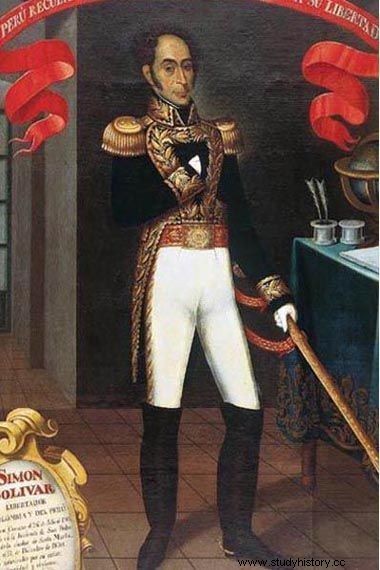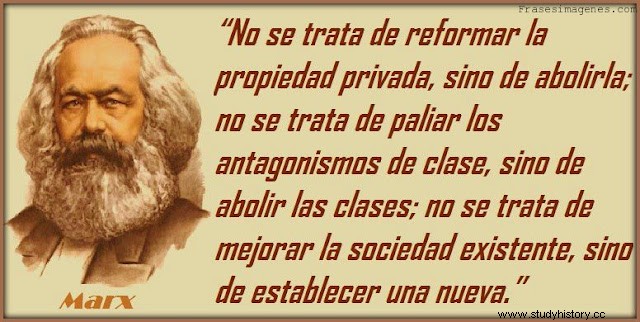Simón Bolívar is criticized by Carlos Marx The devastating opinions with which Karl Marx stigmatizes the authoritarian impulses of Simón Bolívar today constitute a colossal theoretical and political problem for the international Marxist movement which, paradoxically, in Latin America tends to express itself in the form of a Bolivarian anti-imperialist current.
Charles Daña, director of the "New York Daily Tribune", complained to Karl Marx for the "prejudiced tone" with which the father of historical materialism had written a biographical essay on Simón Bolívar that, at Daña's request, was written for volume III of the "New American Cyclopaedia", which circulated in January 1858, almost three decades after the death of the LiberatorIn a letter dated London on February 14, 1858, Marx wrote to Federico Engels commenting on the claims de Daña and said:"As far as the prejudiced style is concerned, I have certainly strayed somewhat from the encyclopedic tone. But it would have been going too far to want to present the most cowardly, brutal and miserable scoundrel as Napoleon I. Bolívar is the true Soulouque" . The mere comparison with the black emperor Soululouque, the dictator of Haiti who rose from among the slaves to commit misdeeds against his own people, puts Bolívar, from Marx's point of view, in the position of an opportunistic dictator and demagogue who had learned with advantages the tricks of American "creole liveliness".
Although he omits the fact that Bolívar collaborated with Petion for the liberation of the Haitian slaves in exchange for British weapons, Marx manages to demonstrate —to the deep regret of the Liberator's worshipers— that the military campaigns undertaken by Bolívar during the War of Independence were nothing more than a display of strategic mediocrity financed by English capitalists and by the British crown itself in order to dominate the vast American market that was dislocating from the decadent Spanish domain.
An "American Spanish"? Marx rudely demystifies the aura of military genius that surrounds Bolívar and exposes him as a calculating and cowardly general to the point of qualifying him as "the Napoleon of Retreats" alluding to recurrent episodes where Bolívar flees in the middle of battle, abandoning his soldiers. , as happened in August 1814 during a battle against the troops of the royalist Boves. And as if that were not enough, Marx foisted on Bolívar the title of traitor, accusing him of having participated in the delivery of the independence fighter Francisco Miranda to the Spanish tyrant Monteverde. In fact, the man from Caracas had begun his military career —as a good son of high-ranking Spanish settlers— in the ranks of the royalist army. At the age of 16, he was appointed by the King of Spain as Second Lieutenant of the Sixth Company of the White Militia Battalion of the Valleys of Aragua; that is to say, he began his career towards power serving the Crown, as a majority of aristocrats and Creoles who later led the independence process supported by the European enemies of the corrupt Spanish monarch Fernando VII.
 SIMON BOLÍVAR During the break with Spain, based on the absolute power conferred by the sophisticated English weapons, the money of the British crown and the funds provided by the elites of "American Spaniards" who faced the "European Spaniards" (terms used by Bolívar himself in several of his writings), the aristocrat Liberator erected his arrogance and almost divine figure on the spoils of the genuine popular fighters for Independence, indigenous and black, becoming undisguisedly uncomfortable with the emergence of commoner leaders such as the leader mulatto Manuel Carlos Piar, hero of Venezuelan liberation, whom Bolívar had executed, according to Marx, "under the false accusations of having conspired against the whites, attempting against Bolívar's life and aspiring to supreme power." Marcos Roitman Rosenmann and Sara Martínez Cuadrado, in the epilogue of the last Spanish edition (Sequitur, Madrid, 2001) of the essay that Aníbal Ponce translated in 1936 for his magazine "Dialectica", affirm that "there is not one single fact that Marx relates that they have not been admitted by the own historians friends of Bolívar".
SIMON BOLÍVAR During the break with Spain, based on the absolute power conferred by the sophisticated English weapons, the money of the British crown and the funds provided by the elites of "American Spaniards" who faced the "European Spaniards" (terms used by Bolívar himself in several of his writings), the aristocrat Liberator erected his arrogance and almost divine figure on the spoils of the genuine popular fighters for Independence, indigenous and black, becoming undisguisedly uncomfortable with the emergence of commoner leaders such as the leader mulatto Manuel Carlos Piar, hero of Venezuelan liberation, whom Bolívar had executed, according to Marx, "under the false accusations of having conspired against the whites, attempting against Bolívar's life and aspiring to supreme power." Marcos Roitman Rosenmann and Sara Martínez Cuadrado, in the epilogue of the last Spanish edition (Sequitur, Madrid, 2001) of the essay that Aníbal Ponce translated in 1936 for his magazine "Dialectica", affirm that "there is not one single fact that Marx relates that they have not been admitted by the own historians friends of Bolívar". Peoples without history The devastating opinions with which Marx stigmatizes Bolívar's authoritarian drives today constitute a colossal theoretical and political problem for the international Marxist movement which, paradoxically, in Latin America tends to express itself in the form of a "Bolivarian" anti-imperialist movement. Marx hated Bolívar openly. He hated him because of his class origin, because of his status as an aristocrat, more than a Creole, greedy for fame and power. A dissolute and lewd "petty bourgeois" who "after leaving the Granada congress and General Santander in office as commander in chief... marched to Pamplona, where he spent more than two months in celebrations and soirees (...), with a treasure of about $2,000,000, obtained from the inhabitants of New Granada by forced contributions, and disposing of a force of about 9,000 men, a third of whom were English, Irish, Hanoverian, and other well-disciplined foreigners," wrote Marx. Joseph Aricó has written an illuminating study on the aforementioned text, explaining that "it was a political evaluation that led Marx to interpret Bolívar as authoritarian and Bonapartist and project, as he used to do, his political hostility to all the activities and even to the personality of the liberator, whom he fiercely mocks throughout his lengthy essay".
According to Aricó, the solidity of the bleak Marxist vision of the Bolivarian myth is based on one of the fundamental theoretical concepts of scientific socialism to understand the anti-colonial problems of the Third World:of Hegelian matrix on the "peoples without history", according to which the revolutionary processes freed at random from a mere positivist imperative, without the consciousness of a hegemonic class capable of imposing its own rationality in the framework of the class struggle, become chaotic and irrational processes "that allowed a mediocre and grotesque character to play the role of hero". Marx then describes the historical events carried out by Bolívar as a sum of coincidences and gratuitous or "positive" facts, that is, contingent, for example, when Marx notes that as a consequence of the successive defeats derived from Bolívar's manifest military incapacity, " one defection was followed by another, and everything seemed to be heading for a total collapse.

At that extremely critical moment, a conjunction of fortunate events changed the course of things again" Among such fortuitous events, the most important were those that were related to the irreversible decomposition of the monarchical and colonial regime, but above all those that had to do with the political and military capacity developed, especially by the autonomous indigenous movements of the Andes — Quechuas and Aymaras—in the fight for their own emancipation, which gentlemen like Bolívar will capitalize on for their own benefit, taking advantage of the sophisticated logistical and financial equipment provided by their British allies.
The Bolivian Code To our surprise, it turns out that one of Marx's harshest criticisms against Bolívar is related to the nascent republic of Bolivia and the obnoxious Bonapartist way (in Marxist terms) with which the Liberator designed the structure of the nascent Bolivian State. As is known, Bolívar moved to the Peruvian Andes after a successful campaign in Ecuador, leaving behind old rivalries and animosities that he had with his own Venezuelan and Colombian co-religionists. When Bolivia was founded, the Liberator drafted his famous Constitution for Life, known by Marx as the "Bolivian Code."
In this core fragment we find perhaps the only references to Bolivia in the vast work of Marx:
"During the campaigns against the Spaniards in Lower and Upper Peru (1823-1824) Bolívar no longer considered it necessary to play the role of commander-in-chief, but instead delegated to General Sucre the leadership of the something military and restricted his activities to triumphal entries, manifestos and the proclamation of constitutions.Through his Colombian bodyguard he manipulated the decisions of the Congress of Lima, which on February 10, 1823 entrusted him with the dictatorship; thanks to a new simulation Upon resignation, Bolívar secured re-election as president of Colombia. Meanwhile his position had been strengthened, partly with the official recognition of the new state by England, partly by the conquest of the Upper Peruvian provinces by Sucre, who unified the last in an independent republic, that of Bolivia. In this country, subjected to the bayonets of Sucre, Bolívar gave free rein to his tendencies towards despotism and proclaimed the Bolivian Code, an imitation of the the Code Napoleon. He planned to transplant that code from Bolivia to Peru, and from Peru to Colombia, and to keep the first two states at bay by Colombian troops, and the last by the foreign legion and Peruvian soldiers. Using violence, but also intrigue, he actually managed to impose, if only for a few weeks, his code on Peru. As president and liberator of Colombia, protector and dictator of Peru and godfather of Bolivia, he had reached the height of his glory… ".
However, it must be recognized that the idea of a Presidency for Life to govern the destinies of the South American Confederation, which Bolívar was trying to build from the Bolivian Constitution so deplored by Marx, was not such a bad idea. In the Speech of the Liberator to the Constituent Congress of Bolivia, written in Lima on May 25, 1825, Simón Bolívar affirms that the figure of a President for Life —whom he defines "as the Sun that, firm in its center, gives life to the Universe "— would be subject to "the narrowest known constitutional limits" and would be deprived of "all influences" delegating powers to other State instances, being the Executive Vice President and successor for life. "By this providence, elections are avoided," Bolívar said, "which produce the great scourge of republics, anarchy, which is the luxury of tyranny and the most immediate and terrible danger of popular governments." There was not without a large dose of rationality in those ideas of Bolívar, or at least a visionary intuition about a Latin American future, especially Bolivian, where representative, party-based and "huayraleva" democracy is part of a culture of corruption that even Marx was not. capable of suspicion 147 years ago..
SOURCE:http://www.soberania.org/Articulos/articulo_1409.htm
